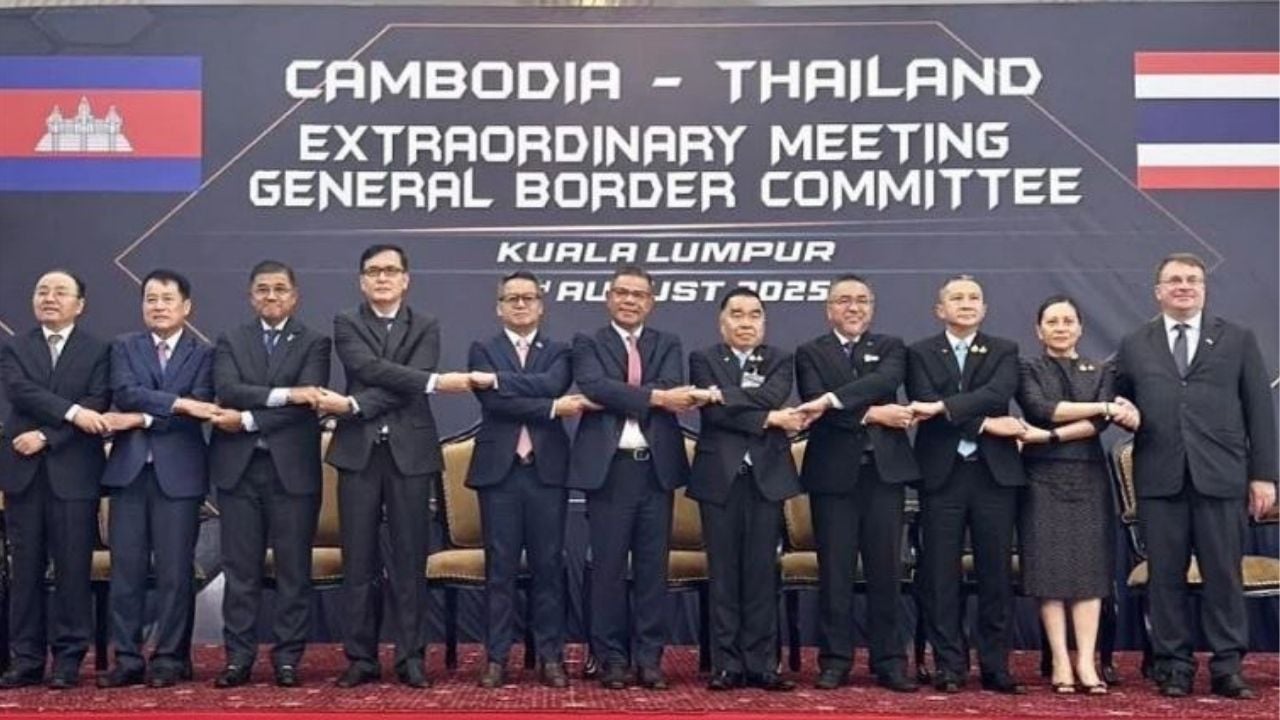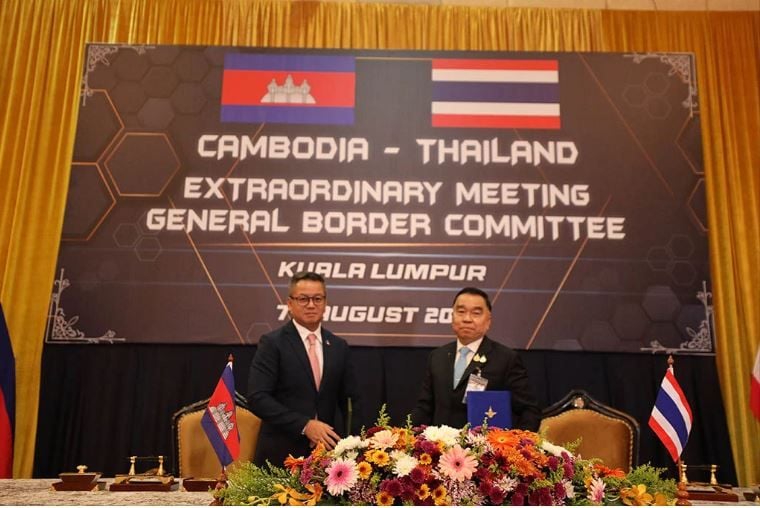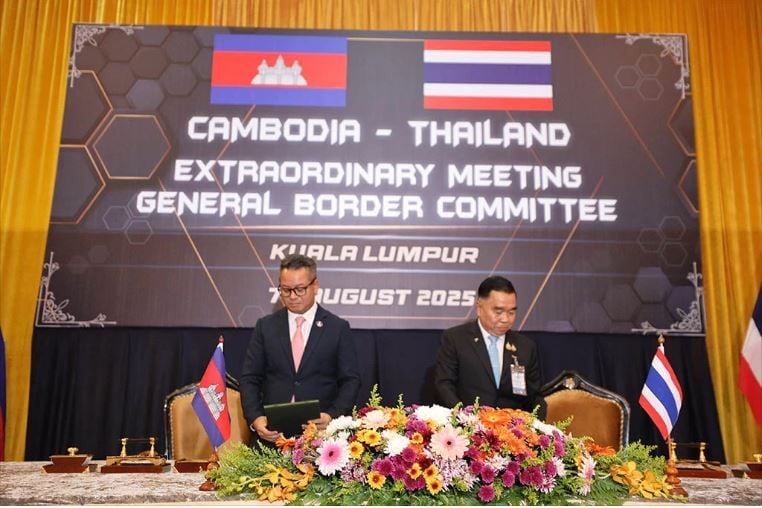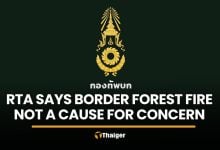Thailand and Cambodia strike border truce in Malaysia
Military leaders sign 13-point ceasefire deal after high-stakes emergency talks to ease rising tensions

Peace talks prevail, for now, as Thai and Cambodian military leaders strike a truce to cool tensions on their volatile border.
At 1.30pm today, August 7, senior officials from Thailand and Cambodia met in Malaysia for an emergency session of the General Border Committee (GBC), where both sides agreed to implement a 13-point ceasefire agreement aimed at ending rising hostility along their shared border.
The high-level meeting, lasting just over an hour, resulted in a signed memorandum of understanding (MoU) outlining a shared commitment to de-escalate and prevent further conflict. The agreement had been developed collaboratively by Thailand’s defence agencies and the Cambodian GBC secretariat over recent weeks.

Thailand’s Deputy Minister of Defence and Acting Minister of Defence, General Nattaphon Narkphanit, and his Cambodian counterpart, Deputy Prime Minister and Defence Minister General Tea Seiha, formally signed the agreed minutes at the end of the talks.
The MoU captures the conclusions of three days of intense negotiations and reflects a renewed hope for calm along the contentious border zone.
“The objective is to bring peace and peaceful coexistence for the peoples of both nations,” said a Thai government spokesperson. “Thailand continues to support the use of bilateral mechanisms for effective dialogue.”
The 13-point plan outlines guidelines for ceasefire enforcement, communication channels between military commands, and coordinated responses to avoid flare-ups in disputed areas.
ดูโพสต์นี้บน Instagram
Agreed Minutes of the Extraordinary General Border Committee (GBC) Meeting between Cambodia and Thailand
August 7, 2025, Kuala Lumpur, Malaysia
I. Ceasefire Arrangement
-
Both sides agree to a ceasefire involving all types of weapons, including attacks on civilians, civilian objects, and military objectives of either side, in all areas and under all circumstances. Both sides must avoid unprovoked firing towards the other’s positions or troops. This agreement must not be violated under any circumstances.
-
Both sides agree to maintain current troop deployments without any further movement as established at the ceasefire time of 24:00 hours (local time) on July 28, 2025. There shall be no troop movements, including patrols, towards the opposing side’s position.
-
Both sides agree not to increase forces along the entire Cambodia–Thailand border. Any reinforcement would risk escalating tensions and hindering long-term conflict resolution efforts.
-
Both sides agree not to undertake provocative actions that may escalate tensions. This includes any military activity entering the opposing side’s airspace, territory, or positions from 24:00 hours on July 28.
Both sides also agree to refrain from constructing or enhancing any military infrastructure or fortifications beyond their side. -
Both sides agree not to use any kind of force against civilians or civilian objects under any circumstances. Such actions would endanger communities, violate international law, and tarnish the international reputation of the non-compliant side.
-
Both sides agree to comply with international humanitarian law in the treatment of captured soldiers, including their living conditions, shelter, food, and medical care.
-
If one side wishes to bring in its wounded soldiers or civilians, the receiving side may respond based on available medical capacity, personnel, and ethics.
-
Captured soldiers must be immediately released and repatriated after hostilities cease, under Article 118 of the Third Geneva Convention of 1949 and Rule 128(A) of Customary International Humanitarian Law.
-
Both sides agree to exchange information and ensure the dignified, timely return of deceased individuals without crossing the border, with appropriate identification and sanitary handling.
-
-
In the event of armed conflict, intentional or unintentional, both sides must consult promptly at the local level via existing bilateral mechanisms to prevent escalation along the border. Prolonged conflict would endanger civilians and troops and complicate peaceful resolution efforts.
-
In particular, both sides agree to:
-
8.1 Maintain regular communications between all army areas, military regions, and border units to peacefully resolve disputes and avoid clashes.
-
8.2 Convene the Regional Border Committee (RBC) meeting within two weeks of this GBC meeting on August 7, 2025. The host country will follow the normal hosting rotation.
-
8.3 Maintain direct and regular communication between Ministers and Chiefs of Defence Forces.
-
-
Both sides agree to refrain from spreading false or inflammatory information to de-escalate tensions, reduce negative public sentiment, and support an atmosphere of peaceful dialogue.
II. Mechanism for the Implementation of Ceasefire Arrangement
-
Both sides reaffirm their commitment to the understanding reached at the July 28 special meeting, including the ceasefire and the formation of an ASEAN observer team led by Malaysia to verify and ensure its enforcement.
-
Both sides agree to assign their respective RBCs to implement the ceasefire, coordinated and observed by the ASEAN observer team led by Malaysia. The RBCs will meet regularly and report to the GBC through their respective chains of command.
-
Until the ASEAN observer team is formally deployed:
-
An Interim Observer Team (IOT) comprising defence attachés from ASEAN Member States accredited to Thailand or Cambodia and led by Malaysia will be independently established in each country.
-
Each country’s IOT, invited by the host in consultation with Malaysia, will observe ceasefire implementation on their respective side without crossing borders.
-
The IOT will coordinate closely with both the RBC and GBC.
III. Date and Venue of the Next Meeting
-
Both sides agree to schedule the next GBC Meeting within one month after August 7 (venue to be discussed).
If not, another extraordinary GBC Meeting will be held with the same format to discuss the ceasefire.

Tensions between the neighbouring nations have flared intermittently over territorial disputes, with military patrols and outposts often accused of provocative actions. The GBC has been the key diplomatic and military platform for diffusing such flashpoints in the past.
This latest agreement, signed on neutral ground in Malaysia, is being viewed as a significant step forward, though analysts caution that its success depends on consistent adherence from forces on both sides, reported KhaoSod.

“The agreement offers a chance for stability, but only if both governments stick to the commitments and avoid inflammatory actions,” said a regional conflict analyst.
Both countries expressed optimism that the ceasefire plan would hold, allowing local communities to return to normal life. For now, the focus shifts to implementation—and whether this fragile peace can be sustained.
Latest Thailand News
Follow The Thaiger on Google News:


























